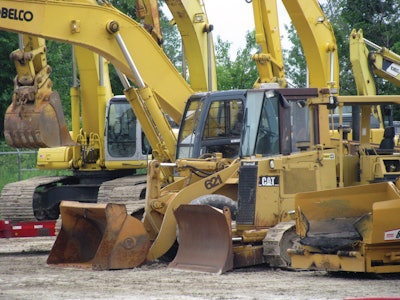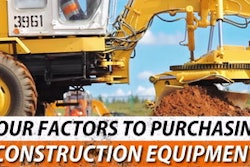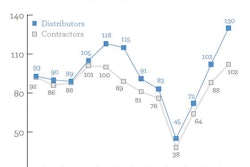
Wells Fargo Equipment Finance's Q1 2012 survey report came across my desk recently expressing that non-residential construction is on the upswing, and the Optimism Quotient (the survey's primary measure of construction executive sentiment) is at 114. This is higher than in 2005 near the top of the construction boom, and is quite a leap from last year's score of 96.
The report also notes that equipment dealers are optimistic. However, with the number of contractors competing to do work, the overall contractor sentiment is to still to hold back on buying additional new and used equipment. It appears that only about 20% of contractors are in a position to consider an increase in new and used equipment purchases, with the remainder holding steady or planning to buy less.
With dealers expecting to sell more in 2012, those contractors interested in new or used equipment will probably be in the driver's seat, especially if dealers stock up for this forecasted equipment sales boom.
Approach with Caution
If you do plan to purchase new or used equipment, I caution you once again to know what your tax position is in general, and especially how the sale or trade of any units affects your position. Many contractors find it beneficial to sell used equipment rather than trade it in. Equipment more than three years old will be almost, if not fully, depreciated; so if you sell a used unit, it will probably be 100% taxable.
Over the last couple of years, if you happened to buy a new unit to replace what you sold, you received the 100% bonus depreciation, which more than offset the gain from the equipment sale. Trading in the old unit for a new one also mitigated the tax situation but reduced your future tax deductions, since the gain on the sold unit offsets the depreciable value of the new unit.
Now that the 100% bonus is no longer available, the gain from an equipment sale can generate an unexpected tax gain and resulting tax payment even though your books reflect a break-even or book loss - hence, the need to understand your tax position for 2012 before you make any equipment moves.
LKE May Defer Tax Gains
If you find you have a need to max your tax deductions, you can sell used equipment at a 100% tax gain and use a Like-Kind Exchange (LKE) transaction to defer the gain over a five-year period. You kind of wind up in the same position as if you traded the unit in, but you get more flexibility to sell the unit on your terms, with a six-month lead time to replace it.
This simple version of LKE can be considered if you have a large amount of equipment to sell and find yourself with a big potential tax bite, but are also planning a substantial equipment purchase to offset what you sold. If you find yourself in this position, you may want to investigate using LKE to not only minimize the tax bill but also the related estimated taxes to be paid in the following year.
LKE can be a complicated process if you're inexperienced in this area. If you need a tax pro to discuss it with, I suggest you call Ron Hodgeman, WTP Exchange, at (513) 721-6333. LKE is all Ron does and he will keep you out of trouble.
Contractor Priorities for 2012
The Wells Fargo Equipment Finance report also noted what contractors want most from dealers, which proved to be a fairly short list. Compared to last year, contractors indicated they want more inventory availability and financing options.
Though less important this year compared to 2011, price issues are still No. 1, and will probably stay that way considering the price increases manufacturers are passing along to cover increasing costs and new technology. To offset cost increases, however, manufacturers are offering new warranty and maintenance programs.
Financing should be more available now, since: 1. You survived this far, and 2. equipment pricing is holding up. Even so, that doesn't mean you will get a loan. You can't win them all.
So in the end, you have to:
•manage your equipment fleet,
•decide what you need to get rid of,
•check on your tax status for 2012, especially if you are selling off used units,
•bargain hard on new purchases
•and make decisions on what is going to be cheaper to rent, keeping in mind that rentals should increase about 10% from last year.




















